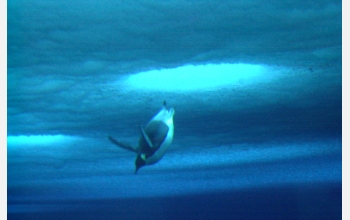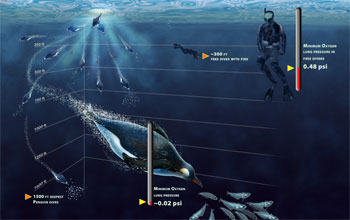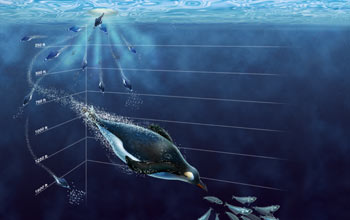All Images
Media Advisory 06-033
Video Explains What Science Learns From Avian Stars of "Happy Feet" and "March of the Penguins"
Understanding Emperor penguin physiology may one day aid doctors
This material is available primarily for archival purposes. Telephone numbers or other contact information may be out of date; please see current contact information at media contacts.

An Emperor penguin dives through a hole into the water below the McMurdo Sound sea ice.
Credit: Emily Stone, National Science Foundation
Download the high-resolution JPG version of the image. (2.3 MB)
Use your mouse to right-click (Mac users may need to Ctrl-click) the link above and choose the option that will save the file or target to your computer.

Depicted here is a summary of an Emperor Penguin's yearly lifecycle.
Credit: Zina Deretsky, National Science Foundation
Download the high-resolution JPG version of the image. (1.2 MB)
Use your mouse to right-click (Mac users may need to Ctrl-click) the link above and choose the option that will save the file or target to your computer.

Scientists study penguin's physiology to learn how they can dive to depths of 300m (1500ft). Penguins spend much of their life in the ocean hunting for krill, fish and squid. Unlike humans, penguins don't suffer from many problems associated with diving, such as decompression sickness (the bends), shallow water black-out, and free-radical damage to tissues. Researcher's work understanding penguins may someday be applicable to anesthesiology and other medical applications.
Credit: Nicolle Rager Fuller, National Science Foundation
Download the high-resolution JPG version of the image. (630 KB)
Use your mouse to right-click (Mac users may need to Ctrl-click) the link above and choose the option that will save the file or target to your computer.

Unlabeled version. Scientists study penguin's physiology to learn how they can dive to depths of 300m (1500ft). Penguins spend much of their life in the ocean hunting for krill, fish and squid. Unlike humans, penguins don't suffer from many problems associated with diving, such as decompression sickness (the bends), shallow water black-out, and free-radical damage to tissues. Researcher's work understanding penguins may someday be applicable to anesthesiology and other medical applications.
Credit: Nicolle Rager Fuller, National Science Foundation
Download the high-resolution JPG version of the image. (630 KB)
Use your mouse to right-click (Mac users may need to Ctrl-click) the link above and choose the option that will save the file or target to your computer.


